The Amygdaloids are scientists who shed their scientific garb at night and take to the stage with songs about love and life peppered with insights drawn from research about mind and brain and mental disorders.
Their first CD, released in 2007, was called Heavy Mental. Theory of My Mind, their second CD, was released in 2010 and features Grammy Award winner Rosanne Cash on backing vocals for two songs (Mind Over Matter, and Crime of Passion). The band’s third set of recordings was an EP called All in our Minds, in which each song had “mind” in the title.
NYU neuroscientist Joseph LeDoux, a pioneer in the study of the brain mechanisms of emotion and memory, is the lead singer, songwriter and rhythm guitarist. He is the best-selling author of two books, The Emotional Brain and Synaptic Self. The lead guitarist is Tyler Volk, Professor of Biology and Science Director of the Environmental Sciences Program at NYU, and author of CO2 Rising, Metapatterns, Gaia’s Body, and What Is Death? Daniela Schiller was a postdoctoral fellow in Cognitive Neuroscience at NYU when she joined the band as the drummer, but is now an Assistant Professor of Psychiatry at Mount Sinai Medical Center. On bass and vocals, is Amanda Thorpe, who studied neuropsychology at University College London and currently works in advertising. Amanda has an independent musical career, her most recent project being the CD, Promenade.
Our Stories
Joseph LeDoux
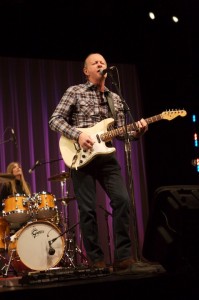 I grew up in Cajun country in south Louisiana and got my first guitar, a nylon string classical, in 1962 at the age of 12. I dreamed of being a folkie. But Greenwich Village was a long way from south Louisiana. No matter, since my interests quickly shifted when Ed Sullivan introduced me and the rest of America to the Beatles. I got a Silvertone electric guitar from Sears and a Fender Deluxe Amp from a local music shop, and together with high school friends formed the Deadbeats, followed by the Countdowns, bands that played a blend of Louisiana R&B and British Invasion. In college, my devotion to playing music waned, apart from a brief stint in a group called Cerebellum and the Medullas and picking an acoustic occasionally. Some time later, I bought a used Fender Mustang, but didn’t play it much in the 70s and 80s, while trying to become neuroscientist. As a scientist, my work has focused on the brain mechanisms of emotional memory, summarized in two books, The Emotional Brain and Synaptic Self. But the guitar bug never stopped biting and in the late 1990s, I traded in the Mustang my life-long dream, a white Stratocaster. The Strat didn’t get proper exercise until I met Tyler Volk, who also turned out to have a Strat. We started jamming, and eventually playing dance songs at parties around NYU. With the arrival of Daniela Shciller (drums) and later Nina Curley (bass), The Amygdaloids was formed. My early musical influences include Cajun musicians around my home town, Eunice, old time country and western greats (Hank Williams, Bobby Bare, Carl Perkins), south Louisiana R&B and rock groups (Boogie Kings, Greek Fountains, Barracudas), and 60s rockers (Johnny Rivers, Stones, Hendrix, Clapton, and electric Dylan, Beatles, Gram Parsons, Neil Young, John Fogerty). Later influences include 80s groups (Television, Talking Heads, Mark Knopfler), jazz greats (Grant Green and Kenny Burrell), and signer song writers (Warren Zevon, Townes van Zandt, and Pete and Maura Kennedy, to name a few). These days I like writing songs to convey information about mind and brain in simple terms because musical communication is powerful and immediate. For my more information on my day job go here.
I grew up in Cajun country in south Louisiana and got my first guitar, a nylon string classical, in 1962 at the age of 12. I dreamed of being a folkie. But Greenwich Village was a long way from south Louisiana. No matter, since my interests quickly shifted when Ed Sullivan introduced me and the rest of America to the Beatles. I got a Silvertone electric guitar from Sears and a Fender Deluxe Amp from a local music shop, and together with high school friends formed the Deadbeats, followed by the Countdowns, bands that played a blend of Louisiana R&B and British Invasion. In college, my devotion to playing music waned, apart from a brief stint in a group called Cerebellum and the Medullas and picking an acoustic occasionally. Some time later, I bought a used Fender Mustang, but didn’t play it much in the 70s and 80s, while trying to become neuroscientist. As a scientist, my work has focused on the brain mechanisms of emotional memory, summarized in two books, The Emotional Brain and Synaptic Self. But the guitar bug never stopped biting and in the late 1990s, I traded in the Mustang my life-long dream, a white Stratocaster. The Strat didn’t get proper exercise until I met Tyler Volk, who also turned out to have a Strat. We started jamming, and eventually playing dance songs at parties around NYU. With the arrival of Daniela Shciller (drums) and later Nina Curley (bass), The Amygdaloids was formed. My early musical influences include Cajun musicians around my home town, Eunice, old time country and western greats (Hank Williams, Bobby Bare, Carl Perkins), south Louisiana R&B and rock groups (Boogie Kings, Greek Fountains, Barracudas), and 60s rockers (Johnny Rivers, Stones, Hendrix, Clapton, and electric Dylan, Beatles, Gram Parsons, Neil Young, John Fogerty). Later influences include 80s groups (Television, Talking Heads, Mark Knopfler), jazz greats (Grant Green and Kenny Burrell), and signer song writers (Warren Zevon, Townes van Zandt, and Pete and Maura Kennedy, to name a few). These days I like writing songs to convey information about mind and brain in simple terms because musical communication is powerful and immediate. For my more information on my day job go here.
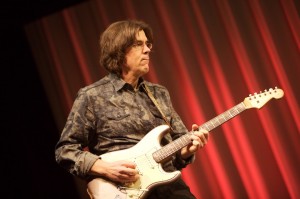 My band in high school was called The Id, to explore inner space, and we gained a smidgeon of notoriety in the Buffalo area as an amalgam of The Who, The Mothers of Invention, and Polish and Italian wedding bands. College in Ann Arbor, Michigan, brought me into Cat’s Cradle, Grunt, and a Cream-influenced, frat-party jam band whose name I can’t recall. Now, in the Amygdaloids, with its direct allusion in more modern neuroscientific terminology to the id, I see a way continue to explore and express inner space with a nexus to the grounding messages of science. My take on the meaning of music: it’s a unique cognitive module, as powerful a mode of thinking as words, imagery, mathematics, or kinesthetics, and has been perhaps the number one vehicle for both human communication and bonding since the Upper Paleolithic. Please see my website in NYU’s Biology Department for information about my global environmental work, and books on the multi-scale interdependence of death and life, how the biosphere works, and universal functional patterns.
My band in high school was called The Id, to explore inner space, and we gained a smidgeon of notoriety in the Buffalo area as an amalgam of The Who, The Mothers of Invention, and Polish and Italian wedding bands. College in Ann Arbor, Michigan, brought me into Cat’s Cradle, Grunt, and a Cream-influenced, frat-party jam band whose name I can’t recall. Now, in the Amygdaloids, with its direct allusion in more modern neuroscientific terminology to the id, I see a way continue to explore and express inner space with a nexus to the grounding messages of science. My take on the meaning of music: it’s a unique cognitive module, as powerful a mode of thinking as words, imagery, mathematics, or kinesthetics, and has been perhaps the number one vehicle for both human communication and bonding since the Upper Paleolithic. Please see my website in NYU’s Biology Department for information about my global environmental work, and books on the multi-scale interdependence of death and life, how the biosphere works, and universal functional patterns.
Daniela Schiller
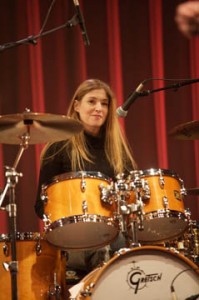 My band in Israel was called “The Rebellion Movement”. We played original Hebrew rock influenced by American folk-rock. In a way, this indeed was a rebellion against new musical streams, no longer giving room for a warm, natural, simple sound. Joining the Amygdaloids was a natural extension of that. Although most music we play or influenced by was written long before I was born, this is the music I truly love (also Jazz but that’s a different story…). To try and capture the “Ringo” sound I got a vintage Ludwig drum set, which I managed to assemble piece by piece. As a scientist, I’m investigating how emotions are processed and represented in our brains. I focus mainly on fear. Given how strong and immediate this emotion is, I’m interested to see how we manage it – what brain processes allow us to get rid of it and bring it back when necessary? Can it be erased for good? Another related question is how emotions get involved in social interaction – do they influence our judgments of the people we meet? My research and the band complement each other in a way – one studies emotions while the other tries to create them.
My band in Israel was called “The Rebellion Movement”. We played original Hebrew rock influenced by American folk-rock. In a way, this indeed was a rebellion against new musical streams, no longer giving room for a warm, natural, simple sound. Joining the Amygdaloids was a natural extension of that. Although most music we play or influenced by was written long before I was born, this is the music I truly love (also Jazz but that’s a different story…). To try and capture the “Ringo” sound I got a vintage Ludwig drum set, which I managed to assemble piece by piece. As a scientist, I’m investigating how emotions are processed and represented in our brains. I focus mainly on fear. Given how strong and immediate this emotion is, I’m interested to see how we manage it – what brain processes allow us to get rid of it and bring it back when necessary? Can it be erased for good? Another related question is how emotions get involved in social interaction – do they influence our judgments of the people we meet? My research and the band complement each other in a way – one studies emotions while the other tries to create them.
Colin Dempsey
 Colin Dempsey is an Irish singer-songwriter, writer and storyteller based in New York. He has performed his unique blend of folk-rock music in Australia, New Zealand, Ireland and most recently the US. When not strumming, Colin is cheering audiences with personal tales of growing up in Dublin. When not telling stories (yes, he does shut-up…) he is writing them–you can catch him doing so at Kettle of Fish in the West Village or Cafe Bar in Astoria…at the bar.
Colin Dempsey is an Irish singer-songwriter, writer and storyteller based in New York. He has performed his unique blend of folk-rock music in Australia, New Zealand, Ireland and most recently the US. When not strumming, Colin is cheering audiences with personal tales of growing up in Dublin. When not telling stories (yes, he does shut-up…) he is writing them–you can catch him doing so at Kettle of Fish in the West Village or Cafe Bar in Astoria…at the bar.
Colin is the singer and guitarist for original folk-rock band Supersmall. Their debut E.P. This Other World can be found on iTunes, Amazon, CD Baby, Pandora, Google Play and Spotify. It was released in June 2013 to positive reviews and they continue to perform in venues all throughout New York. They are currently writing their first full length album.
Colin also plays bass guitar for SOWEARE.
Past Band Members
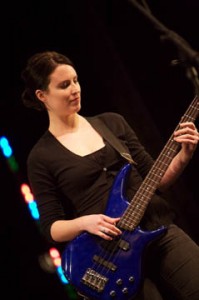 I began playing bass my junior year at Stanford, when I was living in Monterey, CA and taking classes in Neurobiology at the Hopkins Marine Center. I had taught myself folk guitar previously, and often resorted to guitar in my loneliest moments. Bass became something slightly different, that I loved playing with friends, that somehow required accompaniment because of its rhythmic, supporting nature. I liked holding down the low end. When I bought my bass, at the wide-eyed age of 20, I had no idea what I was doing. Had I known then what I know now, I would’ve bought one with passive pickups instead of active ones, which overdrive the older amps. Currently I’m thinking about getting a new bass… they say first loves have their time and place.
I began playing bass my junior year at Stanford, when I was living in Monterey, CA and taking classes in Neurobiology at the Hopkins Marine Center. I had taught myself folk guitar previously, and often resorted to guitar in my loneliest moments. Bass became something slightly different, that I loved playing with friends, that somehow required accompaniment because of its rhythmic, supporting nature. I liked holding down the low end. When I bought my bass, at the wide-eyed age of 20, I had no idea what I was doing. Had I known then what I know now, I would’ve bought one with passive pickups instead of active ones, which overdrive the older amps. Currently I’m thinking about getting a new bass… they say first loves have their time and place.
Because of the way I began playing guitar and the people and bands that influenced me at the time, I have always felt that playing and composing music was a fundamentally emotional endeavor. I think that playing in the Amygdaloids allows us all to both participate in an emotional means of communication with each other and the audience, while making a meta-joke about our scientific models of emotion. In fact, singing about emotion in the brain is not a very emotional experience. But we try to blend both sensibilities. We are frequently asked about the personal significance of blending music with neuroscience, but I do not have a straightforward answer about how my research informs my playing; I rather think of it as a wonderful diversion from work. This might be because I have not yet written and recorded the songs, “The Amgydala Integrates the Biological Significance of Rewarding Events, too,” “My Striatum is Afraid,” or, “My Amygdala cheated on my Nucleus Accumbens with a darned Serotonergic Raphe Nucleus.” Those are just some ideas- I am just beginning my PhD research as well. I’ll keep you posted on more ideas over here.
Gerald McCollam
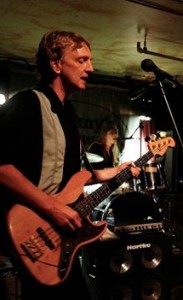 Gerald McCollam is a musician and software developer from South Louisiana. He’s recorded and toured with Richard Hell and John Cale. His strongest musical memory is being at the New Orleans Jazz Fest at age 15 and meeting and shaking the hand of Lightnin’ Hopkins.
Gerald McCollam is a musician and software developer from South Louisiana. He’s recorded and toured with Richard Hell and John Cale. His strongest musical memory is being at the New Orleans Jazz Fest at age 15 and meeting and shaking the hand of Lightnin’ Hopkins.
Amanda Thorpe

Amanda studied psychology at UCL, neuropsychology at Padova University, and music therapy at NYU’s Nordorff-Robbins Center. She has worked at Bronx Pyschiatric, as a private tutor, and as a volunteer with disadvantaged yet musically gifted teenagers and young adults. Amada has four solo recordings, and three band recordings (with Wirebirds and Bedsit Poets). She writes and fights with long-term musical collaborator, Philip Shelley, to create songs that meander through the twist and turns of the emotional being.